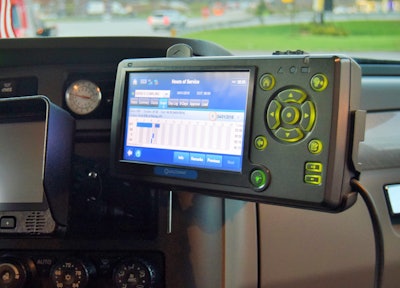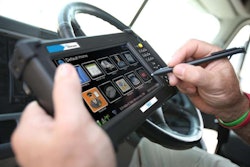
As noted last week in Overdrive reporting on the ongoing lawsuit brought against the DOT’s electronic logging device mandate, there’s a renegade effort of sorts under way by trucker William Trescott to intervene in the case, a measure he’s asked the Supreme Court to take up.
The original complaint in the case was brought by the Owner-Operator Independent Drivers Association and two owner-operators, Mark Elrod and Richard Pingel. The trio is suing the DOT and its Federal Motor Carrier Safety Administration in hopes of having the mandate struck down by the courts for a second time. The plaintiffs argue the rule violates truckers’ Fourth Amendment rights.
Trescott, who said he was bothered by the court’s 14,000-word cap set on OOIDA’s complaint, filed his motion to intervene in the case as to add arguments to OOIDA’s lawsuit. OOIDA via email last week told Overdrive it has no involvement in Trescott’s motions in the case.
The Supreme Court set a May 12 deadline for FMCSA to file a response to Trescott’s motion to intervene. The agency decided not to file a response, per court documents. Trescott says the agency’s response, or lack thereof, is a sign that it doesn’t see his motion “important enough to waste their time on.”

Trescott’s original motion to intervene was struck down in April by the 7th Circuit Court of Appeals, the court overseeing the case, so Trescott sought help from a higher court — the U.S. Supreme Court, to be exact, as it’s the only court above the 7th Circuit appellate court.
Whereas OOIDA’s suit centers on the rule’s location tracking of truck operators — within a one-mile radius — Trescott takes issue with a whole host of issues with the mandate, such as the devices’ capacity for errors, the selection of the judges overseeing the case, driver harassment via ELDs and the potential, Trescott claims, for ELDs to strip truckers of their collective bargaining power.
The Supreme Court has an effective May 29 deadline to make a decision on whether to allow Trescott to intervene in the case, as that’s the deadline for FMCSA to file its official legal response to OOIDA’s March-brought lawsuit.
If the Supreme Court does grant Trescott’s motion, it would delay the court proceedings in OOIDA’s current case, Trescott says, as the court would have to give him a month to file his intervenor’s complaint. From there, all other deadlines in the case would be delayed too, he says, including FMCSA’s deadline to file its response.
If the Supreme Court rules against Trescott’s motion, the case will proceed as-is.
OOIDA’s Todd Spencer this month told Overdrive he expects the court to rule by the end of the year on the suit.
Whatever the 7th Circuit decides, the Supreme Court may well receive another petition to hear the case from either OOIDA or FMCSA, if the losing party decides to appeal.
OOIDA was successful in challenging the agency’s prior ELD mandate, with the 7th Circuit appellate court ruling in the association’s favor in August 2011 to strike down the mandate set to take effect the next year.









